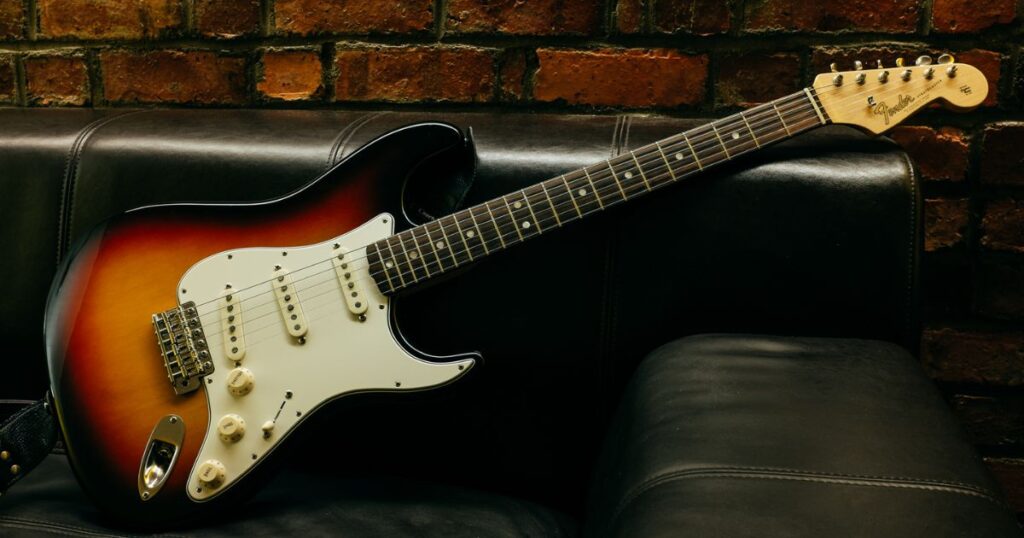Choosing whether to learn acoustic or electric guitar first is a pivotal decision. An acoustic guitar, with its hollow body, produces unamplified sound, making it ideal for folk or unplugged genres. On the other hand, an electric guitar employs pickups and amplification, well-suited for rock and other amplified styles. Your choice hinges on your preferred sound and playing style.
Are you ready to embark on a musical journey but can’t decide whether to start with an acoustic or electric guitar? It’s a common dilemma that many aspiring guitarists face. The choice between the warm, unplugged tones of an acoustic and the electric guitar’s versatility can be exciting and perplexing. Let’s explore which one might be the perfect starting point for your musical adventure.
Before making your choice, consider your musical preferences and goals. Acoustic guitars are ideal for those who love the raw, natural sound and want to develop fingerpicking and strumming techniques. Electric guitars, on the other hand, offer a wide range of sounds and effects and are excellent for those who dream of rock, blues, or jazz. Both have their merits; the decision is all about your personal style and aspirations.
Considerations for Choosing Between Acoustic and Electric Guitar
| Consideration | Acoustic Guitar | Electric Guitar |
| Portability and Convenience | Lighter and more portable | Requires amplification equipment for loud sound |
| Developing Finger Strength and Technique | Thicker strings, higher action, challenges | Lower string action, easier to play |
| Focus on Fundamentals | Emphasis on chords, fingerpicking, and strumming | Access to various effects and sounds from the start |
| Versatility | Associated with folk but can be versatile | Versatile, suitable for rock, blues, jazz, and more |
| Building Calluses | Playing may be tough on fingertips, builds calluses | Less demanding on fingertips |
| Practice in Silence | No need for amplification, quieter | Can be played with headphones to avoid disturbing others |
| Immediate Gratification | Gradual progress, focused on fundamentals | Immediate gratification with iconic sounds |
| Familiarity with Modern Gear | Focus on basics, no gear distractions | Opportunity to learn effects pedals and amplifiers |
| Budget | Typically less expensive | Additional costs for amplifiers and effects pedals |
Choosing the Right Starting Point
Before diving into the details of Fret Buzz On Acoustic Guitar, it’s important to understand that there is no one-size-fits-all answer to the question of whether you should learn acoustic or electric guitar first. The choice depends on your personal preferences, musical goals, and what resonates with you as a musician. Below, we’ll break down the considerations for both options to help you make an informed decision.
Acoustic Guitar
Starting your guitar journey with an acoustic instrument can be an excellent choice for several reasons:
1. Portability and Convenience
Acoustic guitars are typically lighter and more portable than their electric counterparts. You don’t need an amplifier or other equipment, making them easy to carry around. This convenience can be especially beneficial for beginners who want to practice and play anywhere.
2. Developing Finger Strength and Technique
Acoustic guitars have thicker strings and higher action, which means that pressing down on the frets and producing clear notes can be more challenging. However, this challenge can be a valuable part of your learning experience. It helps build finger strength and technique, which can be beneficial when transitioning to an electric guitar later on.
3. Focus on Fundamentals
Acoustic guitars require you to focus on the fundamentals of playing the guitar. Without the distractions of effects pedals or amplifiers, you can concentrate on learning chords, fingerpicking, and strumming techniques. This strong foundation will serve you well as you progress in your guitar playing journey.
4. Versatility
While acoustic guitars are often associated with folk, country, and acoustic pop music, they are versatile instruments that can be used in various genres. Learning on an acoustic guitar can provide a strong foundation for playing a wide range of music styles.
5. Building Calluses
Playing an acoustic guitar can be tough on your fingertips, especially in the beginning. However, this struggle has a silver lining. Regular practice on an acoustic guitar helps you build calluses on your fingertips, making it less painful and more comfortable to play over time.
Electric Guitar

Starting with an electric guitar also has its own set of advantages:
1. Easier Playability
Electric guitars are known for their lower string action, which means the strings are closer to the fretboard. This makes them easier to press down, reducing the physical effort required to produce clear notes. Beginners wondering whether to Learn Acoustic Or Electric Guitar First may find it more comfortable to play an electric guitar as it’s less demanding on the fingers.
2. Wider Range of Sounds
Electric guitars offer a vast array of sounds and tones due to the availability of effects pedals and amplifiers. This versatility allows you to explore different genres and experiment with your sound from the outset, making it an attractive option for those interested in rock, blues, jazz, or metal.
3. Practice in Silence
Electric guitars can be played quietly by plugging in headphones, which is ideal for those who don’t want to disturb others in their living space. This feature can be particularly useful for late-night practice sessions or for those who live in shared accommodations.
4. Immediate Gratification
Electric guitars can deliver a more instant sense of gratification, as they are often associated with the iconic sounds of rock legends. This can be motivating for beginners who are eager to produce exciting sounds early in their guitar journey.
5. Familiarity with Modern Gear
Learning to use effects pedals and amplifiers can be a valuable skill for modern guitarists. If you plan to explore electric guitar extensively in the future, starting with an electric guitar allows you to become familiar with the equipment used in contemporary music.
Making Your Decision
Now that you have a better understanding of the pros and cons of starting with an acoustic or electric guitar, how do you decide which is right for you? Consider the following factors to make an informed choice:
1. Your Musical Preferences
Think about the type of music you are most passionate about. If you are drawn to acoustic genres like folk, country, or singer-songwriter styles, starting with an acoustic guitar makes sense. Conversely, if you aspire to play rock, blues, or metal, an electric guitar may be the better choice.
2. Physical Comfort
Consider your physical comfort and finger strength. If you have sensitive fingertips or hand strength issues, an electric guitar’s lower string action may be more comfortable for you. However, if you are willing to endure some initial discomfort to build finger strength, an acoustic guitar can be a great choice.
3. Practical Considerations
Take into account your living situation and practical considerations. If you live in a shared space where loud guitar playing is not feasible, an electric guitar with headphone capabilities might be your best option. On the other hand, if you value portability and convenience, an acoustic guitar may be the more practical choice.
4. Long-Term Goals
Think about your long-term goals as a guitarist. Are you interested in becoming a versatile player who can switch between acoustic and electric, or do you have a specific genre or style in mind? Your goals will help determine whether starting with an acoustic or electric guitar aligns with your aspirations.
5. Budget
Consider your budget when making a decision. While there are affordable options in both acoustic and electric categories, electric guitars can become more expensive when you factor in the cost of amplifiers and effects pedals. Determine what you’re willing to invest in your musical journey.
Transitioning from Acoustic to Electric (or Vice Versa)
It’s important to note that many guitarists eventually explore both acoustic and electric guitars during their musical journey. If you start with one and decide to switch to the other, the transition can be relatively smooth. Here are some tips for making a successful switch:
Transitioning from Acoustic to Electric
- Master the Basics: Ensure you have a solid foundation in playing chords, fingerpicking, and strumming on your acoustic guitar before transitioning to electric.
- Experiment with Sound: As you switch to electric, embrace the opportunity to experiment with various sounds and tones using amplifiers and effects pedals.
- Focus on Technique: Pay attention to your playing technique as it might need adjustments for the different string action and responsiveness of an electric guitar.
- Start with a Quality Setup: Invest in a good quality electric guitar and amplifier to fully appreciate the potential of the electric guitar’s sound.
Transitioning from Electric to Acoustic
- Acoustic Guitar Selection: Choose an acoustic guitar that resonates with your preferred genre or style, as there are various acoustic models available.
- Build Finger Strength: Be prepared for the initial challenge of pressing down on thicker acoustic guitar strings. Regular practice will help build finger strength.
- Focus on Fingerpicking: Acoustic guitars are often associated with fingerpicking, so consider adding this technique to your repertoire.
- Simplify Your Effects: If you’re used to a wide range of effects on an electric guitar, you may need to simplify your approach for acoustic playing.
FAQs
- Which guitar is easier for beginners?
Acoustic guitars are often recommended for beginners because they have thicker strings, making them gentler on fingertips.
- Can I switch from acoustic to electric guitar later?
- Yes, you can switch, and many guitarists do, but starting with acoustic can build a strong foundation for playing any type of guitar.
- Are electric guitars more expensive than acoustic ones?
- Electric guitars can be more expensive due to the need for an amplifier, but there are affordable options for both types.
Conclusion
The decision of whether to learn acoustic or electric guitar first ultimately comes down to your personal preferences, musical aspirations, and playing style. Acoustic guitars are often favored by beginners for their ease on the fingers and the focus on developing fundamental techniques like fingerpicking and strumming. They’re perfect for those who appreciate the warm, unplugged sound and the simplicity of just picking up the guitar and playing.
On the other hand, electric guitars offer a broad spectrum of sounds and effects, making them suitable for various music genres, such as rock, blues, and jazz. If you’re drawn to the electrifying sounds of amplified music and want to experiment with different tones, an electric guitar might be the right choice for you. Remember that both acoustic and electric guitars have their unique advantages, and there’s no one-size-fits-all answer. Your musical journey is a personal one, and you can always transition from one to the other as you grow in your skills and musical interests. So, go ahead, pick the one that resonates with your heart, and start strumming or shredding your way to musical greatness!




